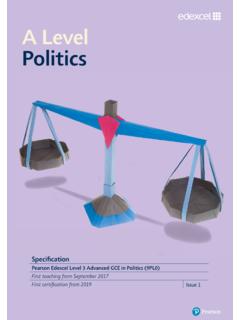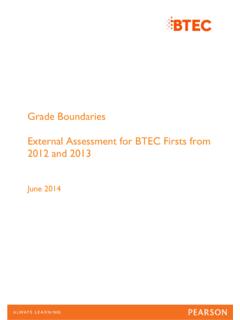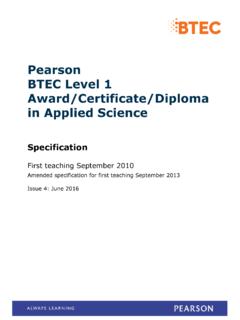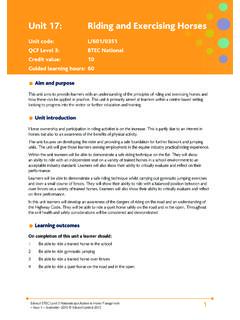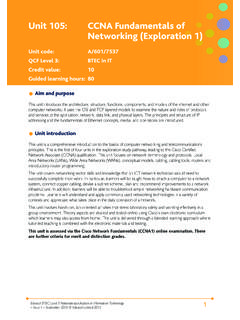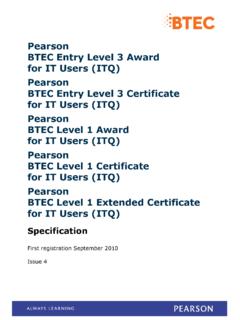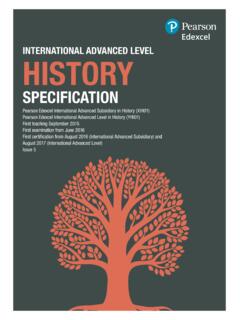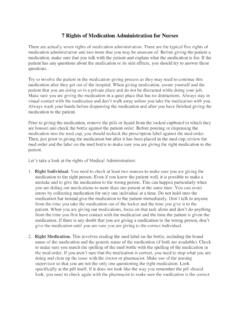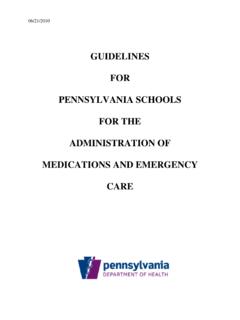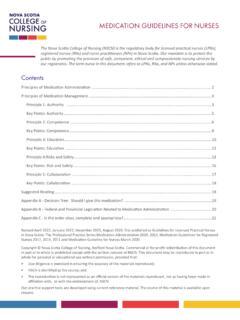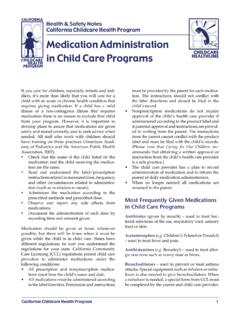Transcription of Unit 47: Administering Medication to Individuals
1 unit 47: Administering Medication to Individuals unit reference number: T/616/7341. Level: 3. unit type: Optional Credit value: 5. Guided learning hours: 25. unit summary The safe administration of Medication requires thought and the exercise of professional judgement. The understanding of all aspects of administration , roles and responsibilities and agreed ways of working is therefore very important. This unit is about the administration of Medication to an individual or where it is part of a larger process where a drug round' may be undertaken. Either context involves working with staff who will lead the process. This unit applies to Medication used for and by Individuals , both prescribed and non-prescribed.
2 The unit is for those who work in a variety of care settings, including hospitals, nursing and residential homes, hospices and community settings such as the individual's home and GP surgeries. The unit does not cover the use and administration of intravenous Medication . In this unit , you will learn about the key aspects of the administration of medicines, including the preparation needed before Administering Medication , the importance of consent, checks and hygiene precautions, and how you should administer Medication safely, and in a way that meets individual needs. The unit identifies the roles and authority involved in the administration of Medication but is not intended to replace any mandatory training required by individual settings.
3 You will gain an understanding of applicable legislation, roles and responsibilities, and the principles of safe practice attached to working with Medication . The unit also covers the procedures you must follow when problems occur with the administration of Medication and the possible effects of Medication on Individuals , including side effects and adverse reactions. Finally, this unit looks at the Medication administration records that must be kept by law. As defined by the assessment strategy, centres should ensure that assessors assessing this unit are technically competent and possess the relevant occupational knowledge. The assessment strategy can be found in Annexe A of the associated qualification specification.
4 978 1 446 95318 1 Pearson BTEC Level 4 Diploma in Adult Care (England) 1. unit Issue 1 January 2018 Pearson Education Limited 2018. Learning outcomes and assessment criteria To pass this unit , the learner needs to demonstrate that they can meet all the learning outcomes for the unit . The assessment criteria outline the requirements the learner is expected to meet to achieve the unit . Learning outcomes Assessment criteria 1 Understand legislation, policies Identify key legislation, policies and procedures relevant to the and guidelines relevant to the administration of Medication administration of Medication 2 Understand the responsibilities Compare the responsibilities and and accountability of self and level of accountability assigned to others involved in the those involved in the administration of Medication administration of Medication 3 Know about common types of Describe common types of Medication and their use Medication and their uses Explain the different routes of medicine administration Describe the common adverse reactions to Medication and the appropriate action(s)
5 Required in line with agreed ways of working 4 Be able to prepare for the Explain the importance of the administration of Medication appropriate timing of Medication Apply standard precautions for infection control in line with agreed ways of working Obtain the individual's consent in line with agreed ways of working Provide support and reassurance to support co-operation from the individual Select, check and correctly prepare the Medication according to the Medication administration record or Medication information leaflet 2 978 1 446 95318 1 Pearson BTEC Level 4 Diploma in Adult Care (England). unit Issue 1 January 2018 Pearson Education Limited 2018. Learning outcomes Assessment criteria 5 Be able to administer and monitor Safely administer the Medication .
6 Individuals ' Medication in line with legislation and local policies according to the patient's care plan and the drug to be administered in a way that minimises pain, discomfort and trauma to the individual in a way that maintains dignity and meets personal and cultural preferences Explain when and how to report any immediate problems with the administration of Medication Assist the individual to be as self-managing as possible Monitor the individual's condition throughout, taking appropriate action if necessary in line with agreed ways of working Explain how to confirm that the individual takes the Medication and does not pass the Medication to others Dispose of waste Medication in line with agreed procedures 6 Be able to maintain Medication Maintain the security of Medication administration records and related records throughout the administration process and return them to the correct place for storage Check the stock level of medications and record necessary actions Complete and safely store Medication and related records in line with agreed ways of working 978 1 446 95318 1 Pearson BTEC Level 4 Diploma in Adult Care (England) 3.
7 unit Issue 1 January 2018 Pearson Education Limited 2018. Content What needs to be learned Learning outcome 1: Understand legislation, policies and procedures relevant to administration of Medication Individual Someone requiring care or support; it will usually mean the person or people supported by the learner. Legislation, guidelines and policies Key legislation: o Medicines Act 1968 and amendments o Misuse of Drugs Act 1971 and amendments o Health and Safety at Work etc. Act 1974. o Data Protection Act 1998. o Control of Substances Hazardous to Health (COSHH) Regulations 2002. o The Human Medicines Regulations (2012). Other legislation relevant to setting, Mental Capacity Act 2005, Access to Health Records Act 1990, Care Standards Act 2000 (receipt, storage and administration of medicines), Hazardous Waste (England and Wales).
8 Regulations 2005. Guidelines: o regulator's fundamental standards of quality and safety o National Institute for Health and Care Excellence (Nice) guidelines, Managing medicines in care homes 2014. o Nursing and Midwifery Council Standards for medicines management'. o Public Health England guidelines o Medicines and Healthcare products Regulatory Agency guidance o Department of Health guidance o Royal Pharmaceutical Society of Great Britain guidance o General Pharmaceutical Council guidance. Policies Policies and procedures for the safe handling of medicines by all workers . prescribing, dispensing, administration , storage and disposal: o sector codes of practice o National Minimum Standards.
9 Learning outcome 2: Understand the responsibilities and accountability of self and others involved in the administration of Medication Responsibilities and boundaries Limits/boundaries and accountability in job role. Carrying out the required checks, matching the medicine received to the individual's name, recording receipts using appropriate documentation, storage instructions. The need for confidentiality, when and to whom information about an individual's Medication may be disclosed or discussed, doctor, pharmacist, other care professionals, relatives/solicitor with enduring power of attorney. Support for Individuals managing own medications. Following instructions in care/support plans.
10 4 978 1 446 95318 1 Pearson BTEC Level 4 Diploma in Adult Care (England). unit Issue 1 January 2018 Pearson Education Limited 2018. Following and completing Medication administration Record (MAR). Recording administration . Monitoring the wellbeing of the individual. Reporting concerns to manager/senior/supervisor. Seeking advice, from GP, pharmacist or nurse. Training requirements. Specialised training, injections, suppositories. Others involved in Administering Medication Others, prescribers (medical and non-medical), managers, social care staff, ancillary staff, clerical staff/administrators. Learning outcome 3: Know about common types of Medication and their use Common types of Medication and their uses Antibiotics used to fight infection.
